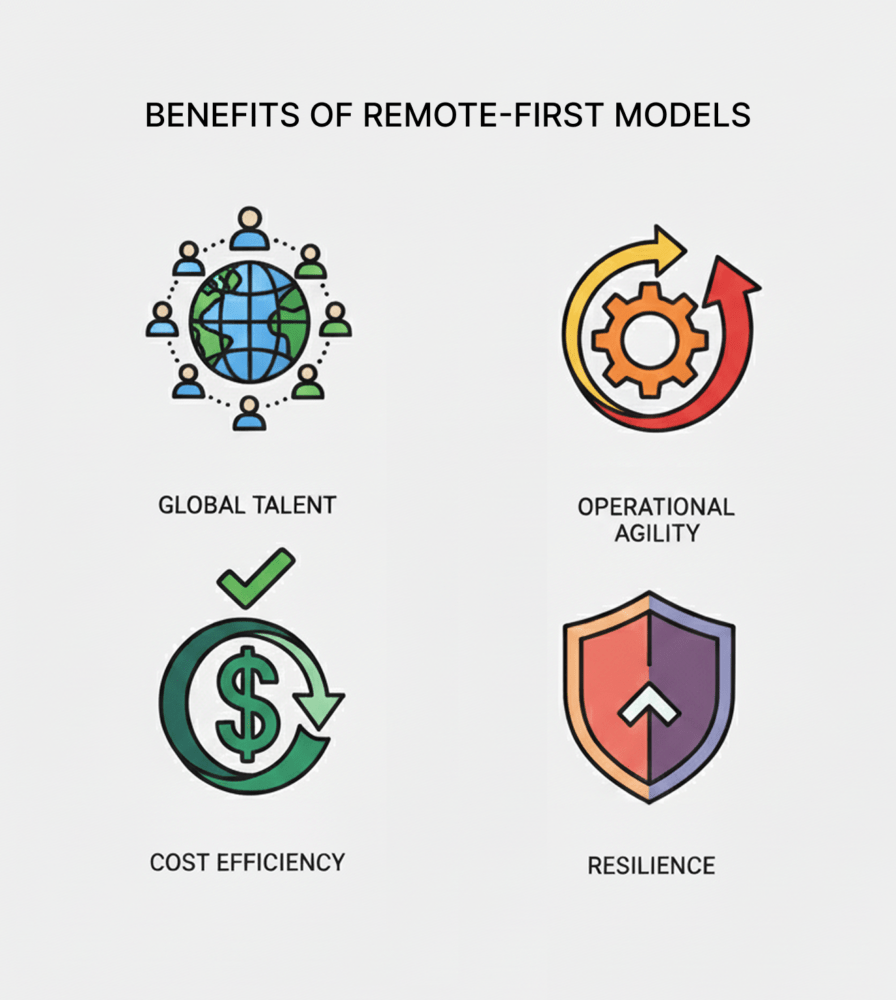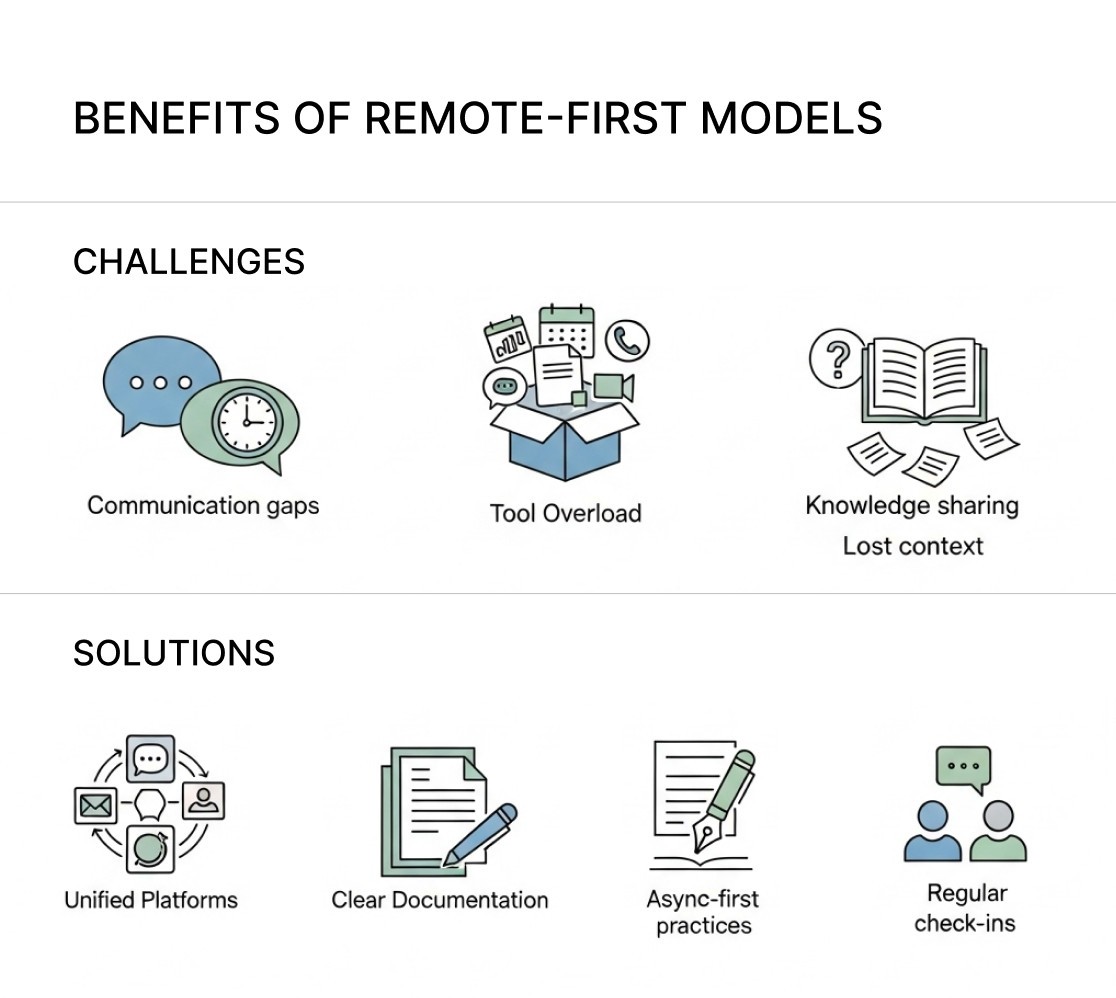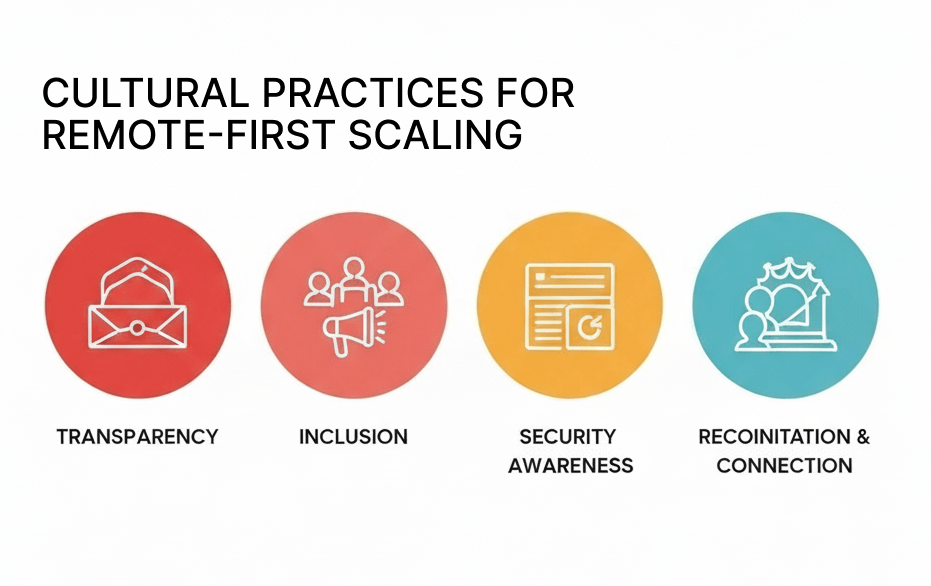Remote-first work is no longer just an option. For many fast-growing companies, it has become the most practical way to scale. By hiring beyond local borders, teams can access global talent, reduce overhead, and move faster. But while the benefits are clear, going remote-first also creates challenges around collaboration, security, and compliance.
This article explores how companies can scale collaboration effectively while staying compliant as they embrace remote-first growth.
The Appeal of Remote-First for Fast-Growing Teams
Fast-growing companies thrive on speed and adaptability. Traditional office models often create bottlenecks. Hiring is limited to a local talent pool, office space adds overhead, and scaling into new markets requires significant time and investment. These constraints slow momentum at a stage when agility is critical.

Remote-first models remove many of these barriers and give scaling teams a competitive edge:
- Access to global talent: Instead of competing for the same local candidates, companies can hire specialists anywhere in the world. This access is especially valuable in fields like engineering, design, and compliance, where local talent may be scarce.
- Operational agility: Expanding into new regions no longer requires physical offices or lengthy relocation processes. Remote-first teams can establish a presence in new markets faster and with less cost.
- Cost efficiency: Office leases, equipment, and relocation packages are replaced with cloud-based collaboration tools and flexible work arrangements. For startups managing tight budgets, this creates room to reinvest in growth.
- Resilience and continuity: Distributed teams are less affected by local disruptions such as natural disasters, political instability, or health crises. Work can continue without major interruptions because responsibilities are spread across regions.
For fast-growing companies, this approach is convenient and an efficient way to accelerate hiring, expand reach, and scale operations in months rather than years, without sacrificing speed or quality.
Collaboration at Scale: Challenges and Solutions
When teams expand across countries and time zones, collaboration becomes more complex. The tools and practices that worked in a small office often break down in distributed environments.
Recent McKinsey data shows a dramatic shift in work models: the share of mostly in-person employees nearly doubled from 34% to 68% between 2023 and 2024, while mostly remote arrangements dropped from 44% to 17%. This volatility highlights why scaling collaboration in distributed teams requires intentional systems, not just ad-hoc tools.

Key collaboration challenges include:
- Communication gaps: Misalignment grows when teams spread across multiple time zones.
- Tool overload: Too many apps create data silos and confusion.
- Knowledge sharing: Without in-person contact, critical context often gets lost.
Solutions that work:
- Unified platforms: Using all-in-one collaboration suites reduces silos.
- Clear documentation: Building a culture of writing ensures knowledge is captured and accessible.
- Async-first practices: Encouraging asynchronous communication prevents burnout and time zone friction.
- Regular check-ins: Combining async updates with scheduled syncs keeps teams aligned.
Collaboration is not about replicating the office online. It is about building new habits and processes that allow remote-first teams to thrive.
Compliance Becomes a Scaling Challenge
As companies expand across borders, compliance becomes one of the hardest issues to manage. A team that starts in one country can quickly grow into a workforce spread across many legal systems. If compliance is not addressed early, risks can multiply as the business scales.
Key challenges include:
- Employment regulations: Each country has its own labor laws covering contracts, benefits, and termination rules.
- Payroll and taxation: Paying workers in multiple currencies while staying aligned with tax laws is complex, and mistakes lead to fines.
- Data privacy: Regulations like GDPR and CCPA set strict rules on how sensitive data is collected and stored.
- Contractor misclassification: Relying on contractors may create risks if they are treated as employees under local laws.
Compliance is not just a legal formality. Ignoring it can create disputes, penalties, and setbacks that slow growth. Addressing it early gives companies a stronger base for global expansion.
Building a Remote-First Compliance Strategy
Fast-growing teams need to make compliance part of their growth plan from the start. Waiting until problems appear often leads to costly fixes. By taking a structured approach, companies can reduce risks and build a stronger foundation for global operations.
Practical steps include:
- Set clear hiring models: Decide early when to bring on full employees and when to use contractors. Each option carries different compliance requirements for contracts, benefits, and taxes.
- Work with trusted partners: Partnering with a reliable payroll services provider or global employment expert gives growing businesses the systems and knowledge needed to stay aligned with local labor laws.
- Create consistent processes: Standardize onboarding, documentation, and data security practices across regions so that every worker is managed under the same baseline standards.
- Stay ahead of regulation changes: Monitor updates to labor, tax, and data protection rules in each country. This helps avoid last minute adjustments that can disrupt operations.
When compliance is built into the structure of a remote-first team, it no longer slows down growth. Instead, it supports expansion by giving leaders confidence that the business can scale without legal or financial surprises.
The Role of Culture in Remote-First Scaling
Technology and compliance systems provide structure, but culture decides whether a remote-first team thrives. As companies grow across countries, building trust and alignment becomes harder. Without a strong culture, even the best tools will not prevent silos, disengagement, or miscommunication.
Scaling companies should focus on practices that create accountability, inclusion, and shared purpose across all regions.

Cultural practices that support scale include:
- Transparency: Share goals, progress, and challenges openly, so employees understand how their work connects to the bigger picture.
- Inclusion: Give every team member a voice, no matter their role or location. Simple steps like rotating meeting times or using async updates help keep participation equal.
- Security awareness: Make cybersecurity and compliance part of everyday responsibility, not just technical requirements. Regular training builds habits that protect both the company and its customers.
- Recognition and connection: Celebrate wins, highlight contributions, and encourage informal interactions. Recognition helps maintain morale and reinforces a sense of belonging across time zones.
Culture is the glue that binds fast-growing remote teams together. When leaders invest in trust and engagement, collaboration becomes easier, compliance becomes natural, and scaling becomes more sustainable.
Conclusion: Scaling with Confidence in a Remote-First World
Remote-first growth gives fast-moving companies the ability to hire top talent, enter new markets, and stay agile. But scaling collaboration and compliance in this model requires intention. By adopting the right tools, processes, and cultural practices, businesses can unlock the full potential of distributed teams while staying compliant and secure.
The companies that master this balance will not only scale faster but will also build sustainable, global organizations ready for the future of work.












